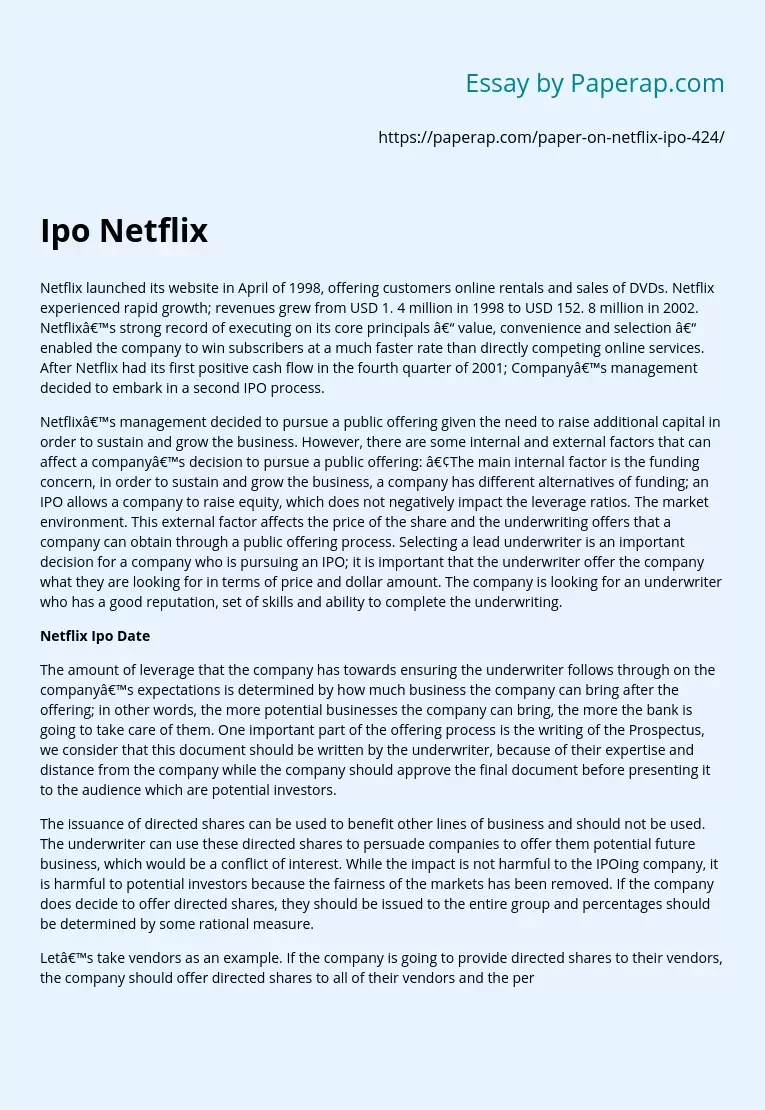Netflix Ipo Date
Netflix launched its website in April of 1998, offering customers online rentals and sales of DVDs. Netflix experienced rapid growth; revenues grew from USD 1. 4 million in 1998 to USD 152. 8 million in 2002. Netflix’s strong record of executing on its core principals – value, convenience and selection – enabled the company to win subscribers at a much faster rate than directly competing online services. After Netflix had its first positive cash flow in the fourth quarter of 2001; Company’s management decided to embark in a second IPO process.
Netflix’s management decided to pursue a public offering given the need to raise additional capital in order to sustain and grow the business. However, there are some internal and external factors that can affect a company’s decision to pursue a public offering: •The main internal factor is the funding concern, in order to sustain and grow the business, a company has different alternatives of funding; an IPO allows a company to raise equity, which does not negatively impact the leverage ratios.
The market environment. This external factor affects the price of the share and the underwriting offers that a company can obtain through a public offering process. Selecting a lead underwriter is an important decision for a company who is pursuing an IPO; it is important that the underwriter offer the company what they are looking for in terms of price and dollar amount. The company is looking for an underwriter who has a good reputation, set of skills and ability to complete the underwriting.
The amount of leverage that the company has towards ensuring the underwriter follows through on the company’s expectations is determined by how much business the company can bring after the offering; in other words, the more potential businesses the company can bring, the more the bank is going to take care of them.
One important part of the offering process is the writing of the Prospectus, we consider that this document should be written by the underwriter, because of their expertise and distance from the company while the company should approve the final document before presenting it to the audience which are potential investors.
The issuance of directed shares can be used to benefit other lines of business and should not be used. The underwriter can use these directed shares to persuade companies to offer them potential future business, which would be a conflict of interest. While the impact is not harmful to the IPOing company, it is harmful to potential investors because the fairness of the markets has been removed. If the company does decide to offer directed shares, they should be issued to the entire group and percentages should be determined by some rational measure.
Let’s take vendors as an example. If the company is going to provide directed shares to their vendors, the company should offer directed shares to all of their vendors and the percentages should be determined by something like percentage of sales. The main group that should receive directed shares is the employees of the company. The employees are stakeholders of the company and they should be rewarded for their efforts in helping to get the company to this point.
If Netflix’s management decides not to inform the “popcorn incident” to Merril Lynch, it could affect the trust with the investment community. We consider that the company should inform Merril Lynch about this incident, asking them for a delay in the IPO process; we consider that while this could affect the IPO process, it is a short term impact, but the loss of trust with the investment community could be a lifetime impact.
The next step for the management is to call the Popcorn Company, explain the situation and ask them for a hold in the launch of the new product to the market; in parallel the company can fix the problem with the movie companies in order to get the licenses to commercialize the products. The movie companies may be able to give Netflix a small bye on this if Netflix can give them something in the future; if the management solves this problem, than it is a non-impact to the pricing discussion.
The company’s and the underwriter’s incentives when it comes to the pricing of the offering are different. Company management wants the highest possible price; however the underwriter wants to complete the sale of all shares, so a lower, more confident price is better for them. The manager can influence the pricing decision during the presentations in the road show; given that the pricing is ultimately decided by market demand; so if the management wants to improve pricing, they should do a good job on the road show to demonstrate the potential of the company.
Netflix Ipo Date. (2019, Dec 05). Retrieved from https://paperap.com/paper-on-netflix-ipo-424/

